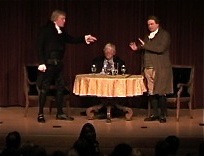Thomas Jefferson was renowned for stressing that authority ultimately rested with the people and not the government. Self-government often seems more like a theoretical concept today, or even a partisan issue. Ultimately, so much of what we see in politics today is a belief that Americans are no longer capable of governing themselves. They need more rules, and regulations to cope, and “free stuff” to occupy their time or even thrive in a modern world. The American Founders wouldn’t have ever thought that way. Self-government was embodied and actualized in the people at that time.
There is a great example from our history that demonstrates that meaning. Os Guinness mentions the story in his masterful book, “A Free People’s Suicide: Sustainable Freedom and the American Future.” Seventy years after the American Revolution a Dartmouth student set out to record the testimony of soldiers who fought in the conflict. One of those men, Captain Levi Preston, then in his 90s, fought in the very first engagement at the Battle of Lexington in Concord in 1775. The student asked Preston if he was inspired by the works of John Locke, or oppressed over the Stamp Act or Tea tax? Preston said he hadn’t heard of Locke and didn’t drink tea and hadn’t seen any stamps [seals] back then. It’s unclear if Preston had more than a rudimentary understanding of the Stamp Act. The student went through a few more litany of questions and became perplexed why Preston took up arms again the British Crown. Preston simply replied, “Young man, what we meant in going for those Redcoats was this: we always had been free, and we meant to be free always. They didn’t mean we should.”
Reading the Founders helps to realize that self-government and a democratic republic are so much deeper than the simple notion of meaning that we all play a role in electing the people that represent us.

Almost three and a half decades ago, the late historian Forrest McDonald delivered the notable Jefferson Lecture in Washington D.C. In it, he said that “To put it bluntly, it would be impossible in America today to assemble a group of people with anything near the combined experience, learning and wisdom that the 55 authors of the Constitution took with them to Philadelphia in the summer of 1787.” McDonald goes on to mention that only 35 of the delegates had attended college. A fact that might surprise modern audiences. Yet, he explains all the complex translations from English to Latin required just to be admitted to college and asks the audience to compare that to the requirements today.
Much of McDonald’s point in his lecture is that the Founders weren’t all that interested in partisan politics but were very interested in the limits of government itself. It’s why our system reflects the need for checks and balances, takes human nature into account, particularly the corrupting nature of power.
Speaking of the Constitution, McDonald says, “It is a body of law, designed to govern not the people, but government itself, and it is written in a language intelligible to all, that all might know whether it is obeyed.” The greatest aspect of the Bill of Rights, by its very proclamation, puts limits on government, not American citizens.
The good news is that there are even more new books and interest on America’s Founding at this point than in much of our history. Yet, whether it’s the 1619 Project, the academy, or popular culture; efforts to destroy their legacy are more brazen than ever.
Turning back to Jefferson, the best reason to read and reread the American Founders is that he said that we are the ultimate guardians of our own liberty. We can’t advance past their basic wisdom and truth about government and the human person if we wish to remain a free society. When we try to do that, we see and feel the chaos and tyranny it inevitably unleashes on society. Reading the documents, history, and biographies of the men who came together to expand freedom reorients us to free principles. The most basic view they shared is one we desperately need today: We are free because God wants us to be free.
Ray Nothstine is the Carolina Journal opinion editor.
This piece was originally published in the May print edition of Carolina Journal.